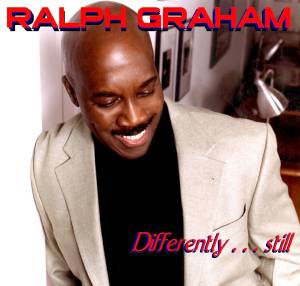Just two issues ago, following the vinyl spotlight falling on Ralph Graham's "Differently" album, we posed the question:
"Wonder what happened to Ralph Graham post RCA?" Needless to say, someone out there knew and, a little while later, the postman was delivering Ralph's new cd - "Differently...Still", reviewed last time - and Ralph was kindly granting an interview which forms the basis of this feature.
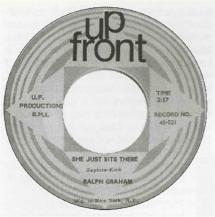
Born in Boston, Massachusetts, with a birthday falling on May 6, Ralph Graham grew up listening to his father’s gospel group. “That was primarily where I got my inspiration,” he said. “My father was with the group and would hear them rehearse all the time.” Such influence may have by-passed his four sisters but, by the age of six, Ralph was already turning his hands and mind to songwriting. Although later influences would come from Motown acts and Marvin Gaye in particular - “...and, believe it or not, Johnny Mathis” - his formative years found him leaning towards country and classical music forms. He qualified: “I would listen to and write cowboy-style songs and country songs. I would have to go hide, because that was not very popular in my neighbourhood to go listening to that type of music. I would also listen to a lot of classical things when I was eight, nine, ten years old. Only because I liked the strings but that wasn’t that popular where I was back then.”
Ralph had become what he described as “kind of like the [singing] star at school” and, by his mid-teens, had formed a school-based singing group which would perform around various Boston clubs. However, he explained that he did not break onto the professional scene in a big way after leaving High School... “Actually, I rather stopped for a while because I got married at a very early age - when I was eighteen. I continued singing for a year [into marriage] but I then went back into school and I didn’t go back to music for about eight years after that.” Such was the break from the business that, when asked if he carried on writing songs in the meantime, Ralph replied: “I don’t think I was.”
The first record to appear on an ‘official’ Ralph Graham Discography is a single for A&M in 1969 - ‘Footsteps In My Dreams’ and Good Friends’ - but, subsequent to our initial conversation with Ralph, two further 45’s came to
light: ‘She Just Sits There’ - a ‘Vietnam song’ - c/w ‘You Had To Hurt Someone’, which appeared on the UpFront label with no identification date of release and ‘More To Life’ c/w ‘Coldwater Flat’, released by Evolution, seemingly in 1971. Having had his memory jogged, Ralph expressed surprise, particularly with regard to the UpFront release. He said: “When I decided I wanted to get back into music, I got a band together in the late sixties but that band kind of fell off. I was friends with a man called Arthur Korb, who was a writer and producer; he wrote ‘She Just Sits There’ and actually he arranged ‘Good Friends’ with me for A&M - he got that single placed with A&M. Arthur wanted me to sing [‘She Just Sits There’] and he also helped me produce the original demo of the Evolution tracks, which were both my own compositions. I did not know those things on UpFront got released, because we recorded them for this studio and it turned out to be a scam. The man [there] would tell people he was going to distribute their records and charge them all kinds of money to record things for them. He would then just press up some copies and that was it. I guess it’s like they are collectors’ items.” Ralph is right in his assessment, as the latest issue of [John] ‘Manship’s Price Guide’ rates the UpFront single at £700!
‘With regard to the Evolution single, Ralph added: “I used the demos to get the attention of this gentleman in New York called Mark Joseph, who was an independent producer and we re-recorded them in a studio in New York, using the famed Motown studio musicians. Paul Riser, who was a friend of Mark’s, did the arrangements to both songs and, if you get a chance to hear them, you’ll hear the Motown signature in both cuts. In fact, we hoped Motown would pick up on them but, when the sought-after Motown deal fell through, we selected Evolution.’
Unfortunately, the A&M 45 was only a one-off and it was nearly five years before the consistently acclaimed ‘Differently’ album on Sussex, ironically a label distributed by A&M at the time. “In the interim I was playing around with a band,” he advised. “We played a lot of different
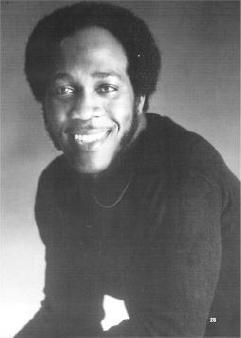
clubs. I was actively performing, just doing local clubs around the Boston area. And I ran into my then manager, Doug Kinan, who knew nothing about the business but he was very cocky and confident. He said: ‘I bet I can get you a contract’ and I said ‘but you don’t know anything about the business’. He said ‘you don’t have to know anything about the business. I can get you a contract; where do I have to go?’ I said ‘Go to California and meet somebody’ and he said ‘Okay’. He called me from California two weeks later - he was sitting in the office with Herb Alpert and Jerry Moss and he is getting me a contract with Sussex records and Clarence Avant.”
Both the ‘Differently’ album and, in particular, its title track has had their worth extolled in these pages on a number of occasions, so it came as something of a surprise when Ralph described the ease with which he wrote that song... “I wrote [it] in literally ten to fifteen minutes, sitting in the car. That was born out of frustration, when I was trying to get a contract and people were telling me ‘you’ve got to do this with your music and you’ve got to take a song and you’ve got to do it this way, you’ve got to do it this way’, you know what I mean? So that song was born out of frustration. I don’t know where I was going at the time but I just sat in the car and wrote that song out.”
The album itself was put into production following the Sussex signing and, as can be seen from the aforementioned ‘vinyl spotlight’. Production chores were shared between the team of Terry Woodford and Clayton Ivey, using studios in Alabama, and Jimmy Briggs out of California and New York. Although not made totally clear from the album notes with regard to the Briggs’ productions, Ralph said: “Most of them we did in California [at Crystal Sound Recorders, Hollywood]. Only a couple of tracks were done in New York and that may have only been the vocals.” However, to this listener, it is the Woodford/lvey cuts that just have the edge and it seems these are the ones that find most favour with Ralph too... “I liked those sessions. They were a lot more soulful and the way they put things together. I just loved the energy in the studio and the whole entourage of musicians.” One of the latter, Ralph’s own ‘I Don’t Want To Play This Game’ was picked up by Bill Coday for Epic - “I think Clarence was instrumental in that, because that was one of his favourite songs from the album.” - but, despite other artists picking up on ‘Differently’ itself over the years, Sussex chose not to issue it on 45. Did Ralph agree that was a surprisingly bad move? “I really don’t know why they didn’t,” he agreed. “I think, at the time, they felt that everything had to be an uptempo song and even though ‘Differently’ was the one song that got pulled off the album and re-recorded by so many different artists, they just never released it as a single. Bill Withers was on the Sussex label with me at the same time and they released Ain’t No Sunshine’, so I don’t know why they never released ‘Differently’.”

Although it could be argued that Sussex failed to promote Ralph Graham as an artist as strongly as they might have, it is gratifying to know that, over the years, they - or, to the point, Clarence Avant - have come good with regard to royalties. ‘Well, the one thing that I can say from Sussex... I must say that Clarence Avant has been the only one that I still get a royalty cheque from and he doesn’t have to because I wouldn’t know. Even today, once a year I still get something. The others I never see anything from but you either get out of it and complain or you stay with it and get what you can out of it.”
Thus, the stay at Sussex was comparatively short and, a couple of years later, he turned up on RCA, where, from the label debut album, ‘Wisdom’, he hit the ‘Cashbox’ r&b chart with ‘Changes’. Nevertheless, such r&b categorisation is something of anathema for Ralph and this and other topics with regard to the RCA sets produced some serious conversation. For those not in the know, Ralph had two RCA album releases, Wisdom’ in 1976 and ‘Extensions’ a year later. Neither had an actual photo of the artist on the cover, although the second did carry, in rather obscure fashion, a part-face drawing. Both albums featured only Graham compositions, with production of ‘Wisdom’ credited to Leon Pendarvis and ‘Extensions’ finding Ralph himself taking over the helm. Very little information is given on the sleeve of the later set but the label debut credits a whole plethora of musical ‘names’ of the day. In his own words...
"I changed managers and she was instrumental in getting me with RCA. I don’t remember all the details, I just remember being in New York in the studios. Leon was such a well-known producer at the time and I liked his energy. It was all new to me at that time having this big huge production. I think I was awed but working with all those musicians that were so well known, I just kind of went along and said that’ll be okay. I felt a little bit uncomfortable with the length of some of the arrangements and the extent of the arrangements but that was it. No, the lack of picture was nothing to do with being camera shy [laughs!] but it was intentional because, during that time, they were classifying everything by black artists as r&b and therefore you could not get any airplay on any other stations. That was a big battle and a big fight of mine - and a lot of other artists were fighting it as well. It was more racist than anything else. They would just categorise everything black as r&b. I mean they would have Sarah Vaughan as r&b! Black artists were just stuck in the r&b file and none of the white stations would touch it. So I put the albums out without a photograph so they would not look, they would just have to listen to the music. I did not want to be simply put in an r&b pigeonhole. In fact, really they couldn’t find a pigeonhole for me. You know, I was at the offices of RCA and one of the producers there... he looked at me and he said ‘Ralph, it’s just not black enough’. And I was talking to a white man! That’s the way it was.”
Of his RCA material, ‘Song About Nothing’, from the Wisdom’ set, is a particular in-demander through to this day. Not dissimilar in construction to ‘Differently’, Ralph has given it a slight remastering on his new cd. Last issue’s ‘Cassette Collection’ picked up on the equally beautiful ‘When Love Is Gone’ from the ‘Extensions’ album and it was after this set that Ralph Graham, the artist, disappeared from the scene.
“I got out of the business because my first wife died with cancer,” he explained. “I had actually just signed with Columbia Records and they wanted me to move to California. I was doing a lot of co-writing there. I was all packed up and ready to go but I had two children and, when she passed away, I made the decision to get out of
it. Columbia were only going to take care of me for the year. They were young and I would have had to drag them to California. We had been separated but I was going to have to take the boys to a whole new climate and a whole new support system and I was going to be in the studio 24/7. I just couldn’t do it. As a result I didn’t do anything. I didn’t even listen to my own music for nine years. That was a pretty depressing time but I had another son from a second marriage and, when he went to college, I decided that was when I wanted to get back into writing. That’s what I did. I started out just getting into writing- and I joined this church. I was just singing in the choir and started doing a couple of solos. Then I got asked ‘can you do my wedding, can you do this’. So I started with a concert and it just snowballed.”That snowballing resulted in hooking up with Icarian Productions, getting the Ralph Graham name back out there again and the Differently. Still' cd, principally designed to demonstrate the man's versatility while he puts together a brand new cd of his own material. lcarian Productions' Margot Northam told 'In The Basement': "When we did a promo for a concert last year, it hit the papers and that's when we really knew that people like you had been looking for Ralph.At the actual concert, someone came up to me and said 'His band used to play in my garage twenty years ago!'. Ralph has been doing some shows and the songs that people resonated with from that time period - 'Song About Nothing' and 'Differently'."
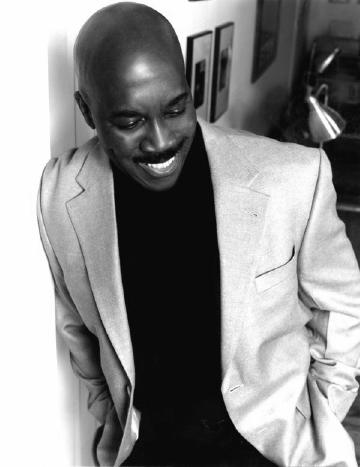
Ralph himself drew attention to the opening cut on his cd, 'If I Should Lose You' which, although not the same song, carries the same title as a track from the 'Extensions' album. This beat-ballad has stirred some activity on the internet... "You could say I plagiarised from myself." he laughed. "Now it is surfacing up all over the place, I have changed the title to 'Losing You', to avoid conflict." Coming right up to date, he added: "Right now I'm in the studio. Because, when I got back into it, I wrote a whole slew of songs. At the moment I'm recording a new cd and this one will be all my own stuff. I originally started out pitching songs to other artists when I got back into it and I had a publisher who got rather sidetracked with '9-11'. As a matter of fact, I had Whitney Houston interested in a couple of the songs - and I had Destiny's Child interested in 'Life In The Game Of Love' incidentally. Then they broke up subsequently and a lot of other things happened. You know how it is, it's hot for the moment. That was inspirational and not the setback it may appear because it was inspirational to know there was that interest. So now I'm just going to do it myself. My big plan is to get product out there that is of mine. I don't mind doing covers but I really think my biggest attraction has been writing my own material. That's what got me into the business."

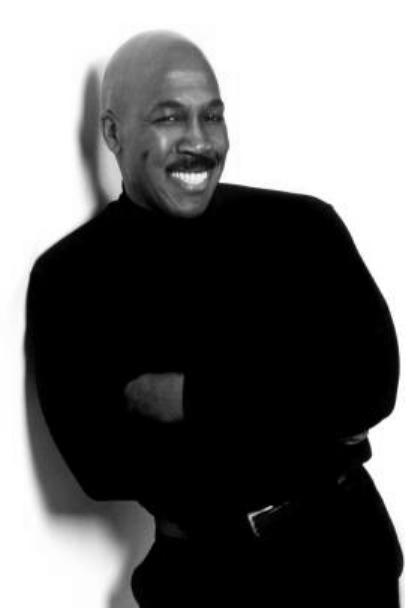

 clubs. I was actively performing, just doing local clubs around the Boston area. And I ran into my then manager, Doug Kinan, who knew nothing about the business but he was very cocky and confident. He said: ‘I bet I can get you a contract’ and I said ‘but you don’t know anything about the business’. He said ‘you don’t have to know anything about the business. I can get you a contract; where do I have to go?’ I said ‘Go to California and meet somebody’ and he said ‘Okay’. He called me from California two weeks later - he was sitting in the office with Herb Alpert and Jerry Moss and he is getting me a contract with Sussex records and Clarence Avant.”
clubs. I was actively performing, just doing local clubs around the Boston area. And I ran into my then manager, Doug Kinan, who knew nothing about the business but he was very cocky and confident. He said: ‘I bet I can get you a contract’ and I said ‘but you don’t know anything about the business’. He said ‘you don’t have to know anything about the business. I can get you a contract; where do I have to go?’ I said ‘Go to California and meet somebody’ and he said ‘Okay’. He called me from California two weeks later - he was sitting in the office with Herb Alpert and Jerry Moss and he is getting me a contract with Sussex records and Clarence Avant.”
 Although it could be argued that Sussex failed to promote Ralph Graham as an artist as strongly as they might have, it is gratifying to know that, over the years, they - or, to the point, Clarence Avant - have come good with regard to royalties. ‘Well, the one thing that I can say from Sussex... I must say that Clarence Avant has been the only one that I still get a royalty cheque from and he doesn’t have to because I wouldn’t know. Even today, once a year I still get something. The others I never see anything from but you either get out of it and complain or you stay with it and get what you can out of it.”
Although it could be argued that Sussex failed to promote Ralph Graham as an artist as strongly as they might have, it is gratifying to know that, over the years, they - or, to the point, Clarence Avant - have come good with regard to royalties. ‘Well, the one thing that I can say from Sussex... I must say that Clarence Avant has been the only one that I still get a royalty cheque from and he doesn’t have to because I wouldn’t know. Even today, once a year I still get something. The others I never see anything from but you either get out of it and complain or you stay with it and get what you can out of it.”



